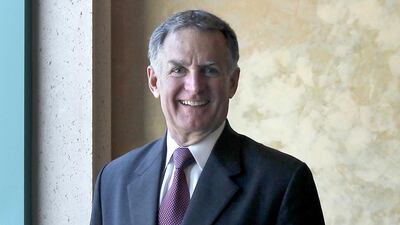“I take a pretty long-term view of the long term,” says John Veihmeyer, the global chairman of the accounting firm KPMG.
The 60-year-old American was speaking in the context of the oil price – more on that later – but the statement illustrates how the big accountants’ view of the world, and of their businesses, has irrevocably changed. They are no longer simple bookkeepers, looking at a corporation’s financial results from quarter to quarter from an audit standpoint.
The big accounting firms have shifted to marketing themselves more as knowledge centres than bean counters, pressing the investment banks, law firms and management consultants by offering a full spectrum of services in the financial and corporate world.
Mr Veihmeyer embodies that approach. He was in the UAE last week to attend KPMG’s annual global summit – a very elaborate “off-site” meeting of 350 of the firm’s partners – but was thinking more about big regional and international issues, as much as the nitty gritty of running an accounting firm.
Holding the summit in Dubai serves several purposes for KPMG, he explains. “The Middle East is very important for KPMG and we see it as a growth region. It’s good for the partners to see the region, and to be seen in the region. It shows them what the challenges and opportunities are. It introduces our partners to the clients, and also shows the local marketplace that we regard the region as important,” he says.
So what does Mr Veihmeyer see as the region’s challenges?
“Well, there are several. The first lies in referring to it as a region, when in fact there are significant differences between different jurisdictions,” he says.
“The next lies in short-term issues like the price of oil, which is affecting companies in the region. I don’t think there is going to be any immediate recovery. They’ll have to live with oil in the US$40 to $60 [per barrel] price range for the next 12 months at least.”
This is where the long-term view comes in. KPMG advises governments and big corporations on strategy, and Mr Veihmeyer says that from his discussions a fairly fundamental reappraisal of attitudes is taking place in the Middle East, and the energy-rich Arabian Gulf countries in particular.
“Naturally, governments will be looking for other sources of revenue. They will be looking at value-added tax and maybe other forms of consumption tax,” he says. “But sovereign governments will have to weigh up the decisions separately. Taxes, of course, are relevant for consumer buying decisions, and that’s what governments in the region are evaluating. They are also carefully looking at reducing their own expenditure.”
The other big challenge is in the heightened geopolitical risk perceived in the Middle East, indeed in the world at large. Just a few weeks ago KPMG published the results of its annual survey of global chief executives, in which it polls the attitudes of 1,200 chief executives. One feature of the results was a sense of growing risk.
“Geopolitical risks are high on the agenda of most chief executives. The severity of those risks varies over time, but right now we’re at a stage in the cycle where they are higher,” he says.
There are also other risks on the minds of business chiefs. “There is also an escalating focus on new and tougher regulation. Without doubt it is having an impact on companies. The costs of compliance are going up, and some industries, especially financial services, are having to think very hard about that,” says Mr Veihmeyer.
Despite these risk factors, most chief executives seem to be remaining fairly positive about the business outlook. The survey found that 62 per cent were optimistic about their economies and growth prospects, and a big majority – 78 per cent – were in the “hiring” phase of the recruitment cycle.
“They [the chief executives] see Europe as turning round and are more optimistic about the US than they have been for a couple of years. True, China is worrying, given the large number of emerging market economies that benefited from China’s booming economy in the past decade. But overall, there is still a high degree of optimism,” he says.
One cause for this positive outlook, Mr Veihmeyer says, is the potential for business and corporate growth in the application of new technology, which is especially relevant to Dubai.
“We see lots of business opportunities in how they incorporate the new ‘disruptive’ technologies, and this applies very much to Dubai, which ranks very high on the world leagues of ‘smart cities’,” he says.
“Dubai doesn’t have to overcome ageing infrastructure. It is starting from a much better base. It has a determination to be a leader from a technology enhancement standpoint, and that has to do with the commitment of the Dubai leadership.”
He believes that business leaders and policymakers in the region are aware of the potential to transform their economies in light of technological advances, and that the globalisation of markets and industries will continue.
“It’s an inevitable evolution that is continuing to accelerate,” he says.
Despite market volatility, he thinks that traditional areas of KPMG’s bread-and-butter activities such as mergers and acquisitions advice, and alternative investment strategies, will continue to be important earners for the firm.
The relentless search for talent at the highest levels will carry on.
“Most chief executives have big plans for hiring because they see the need to fill the gap in skills their companies have today, and the ones they will need three or five years ahead,” says Mr Veihmeyer.
All this fits in with KPMG’s ambitious plans for the Middle East. “We’re going to build on our strengths here to be a market leader in the region,” he says.
fkane@thenational.ae
Follow The National's Business section on Twitter

